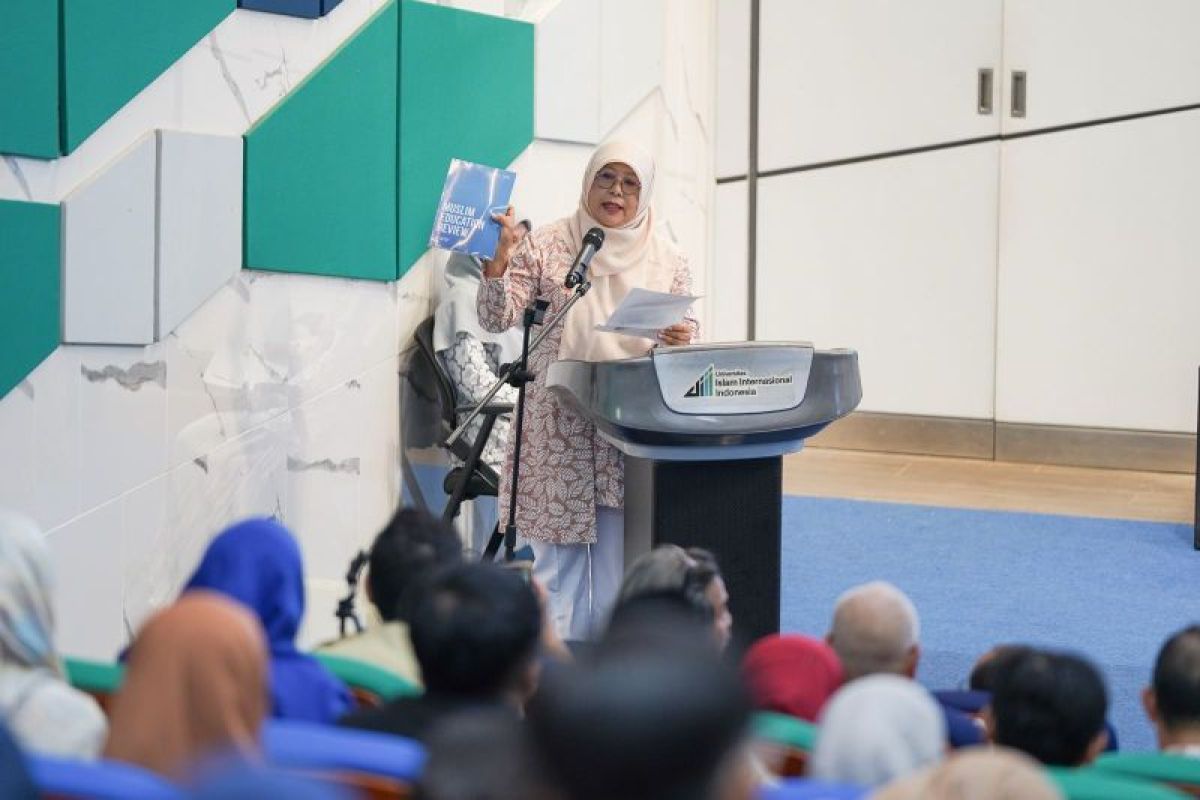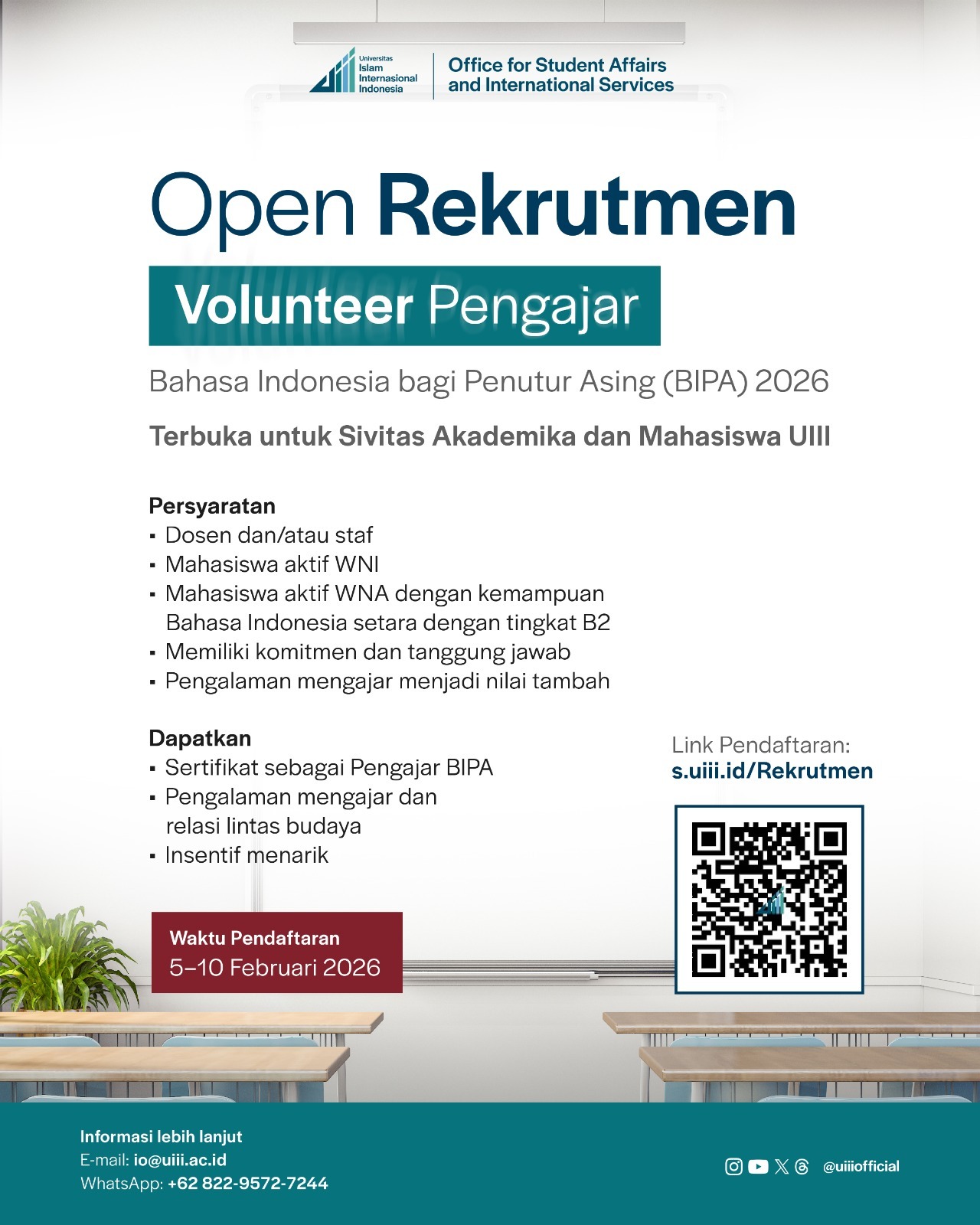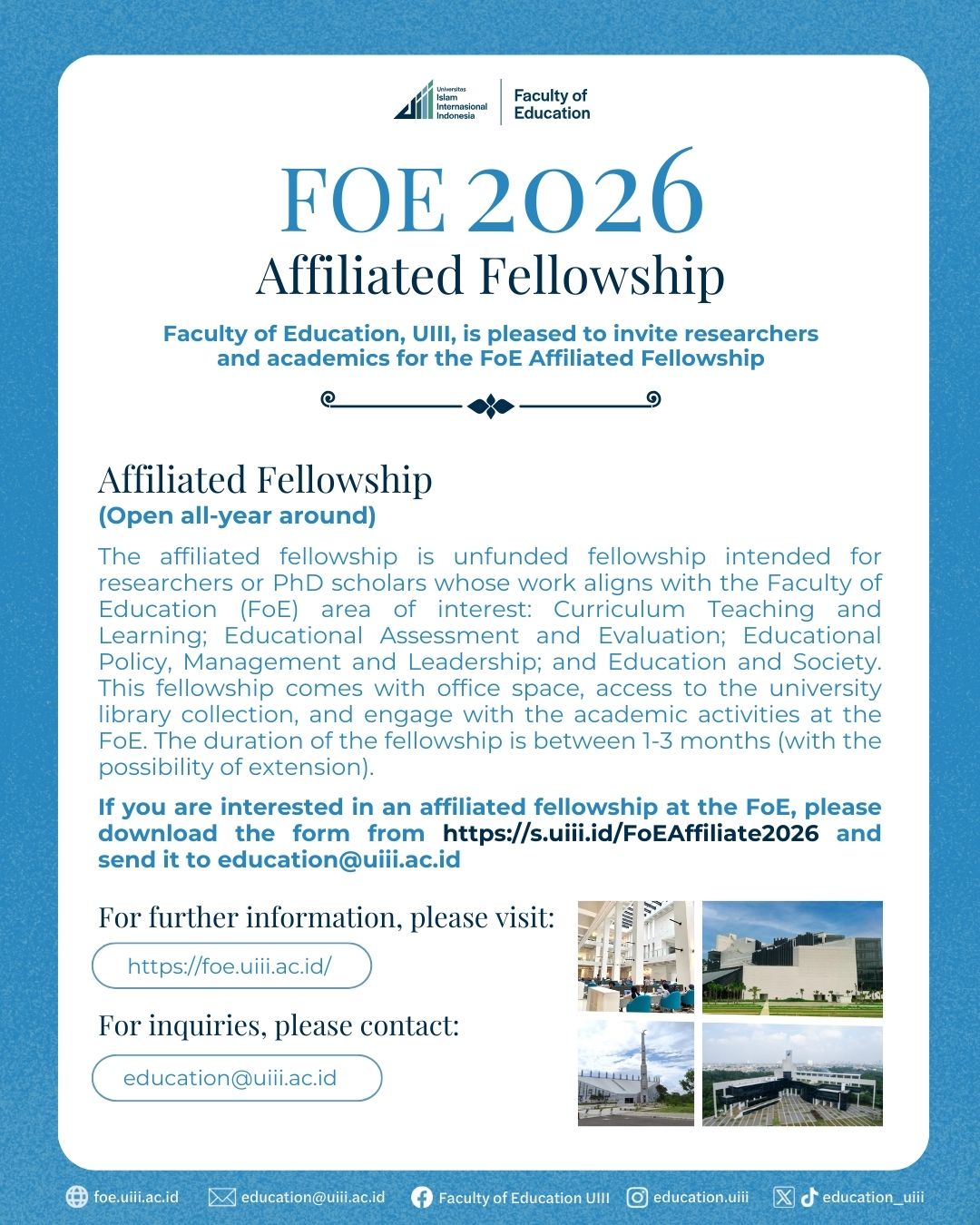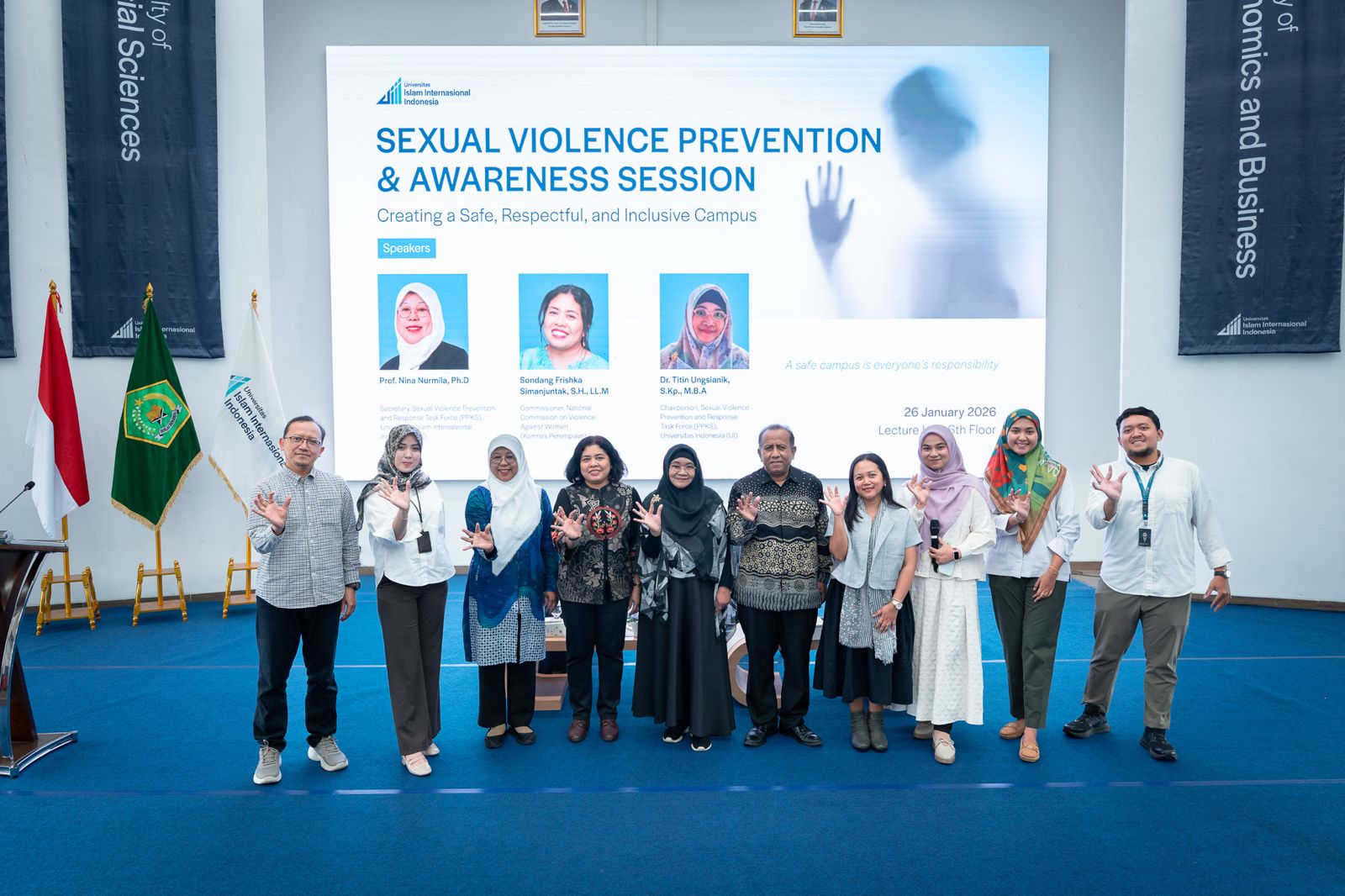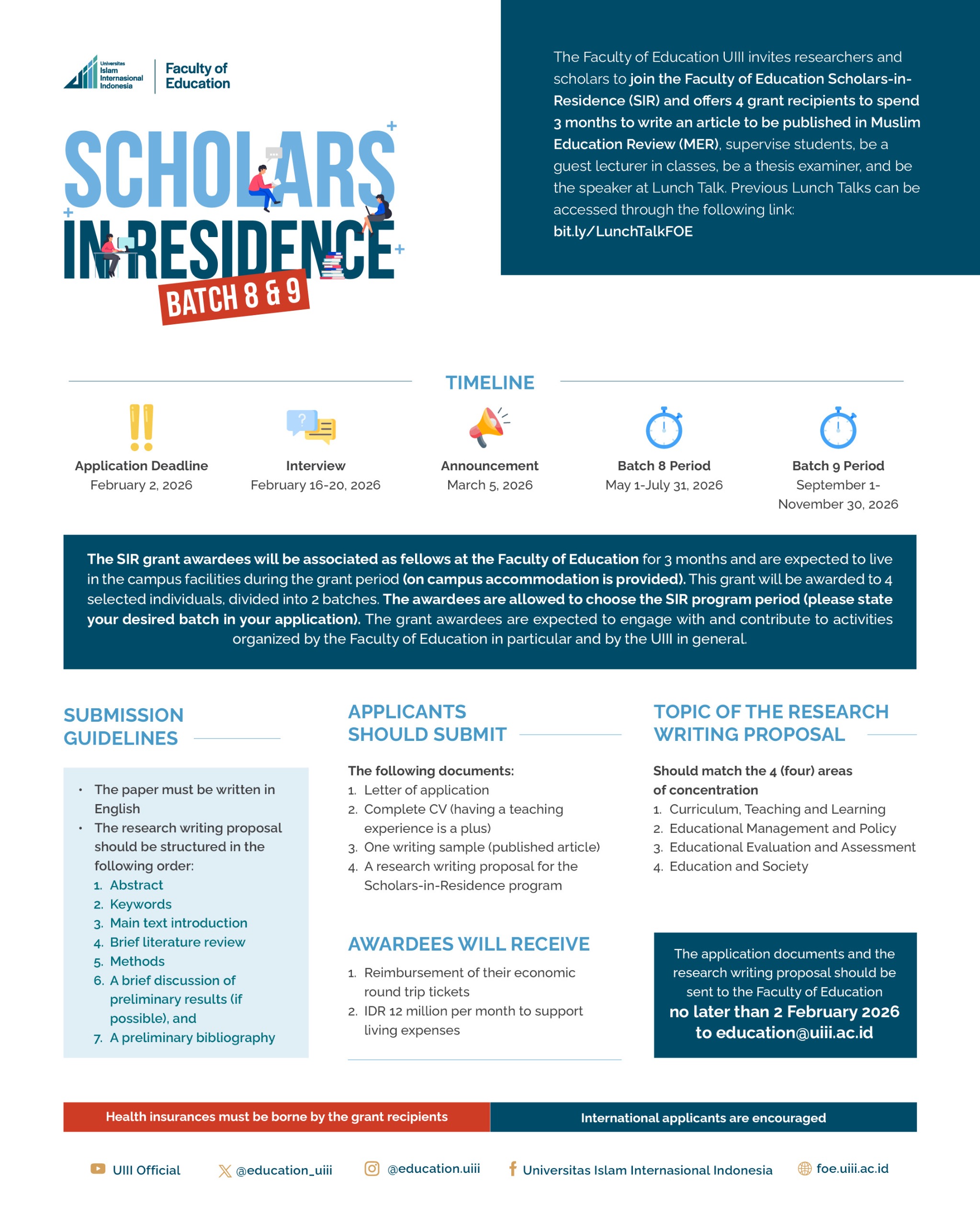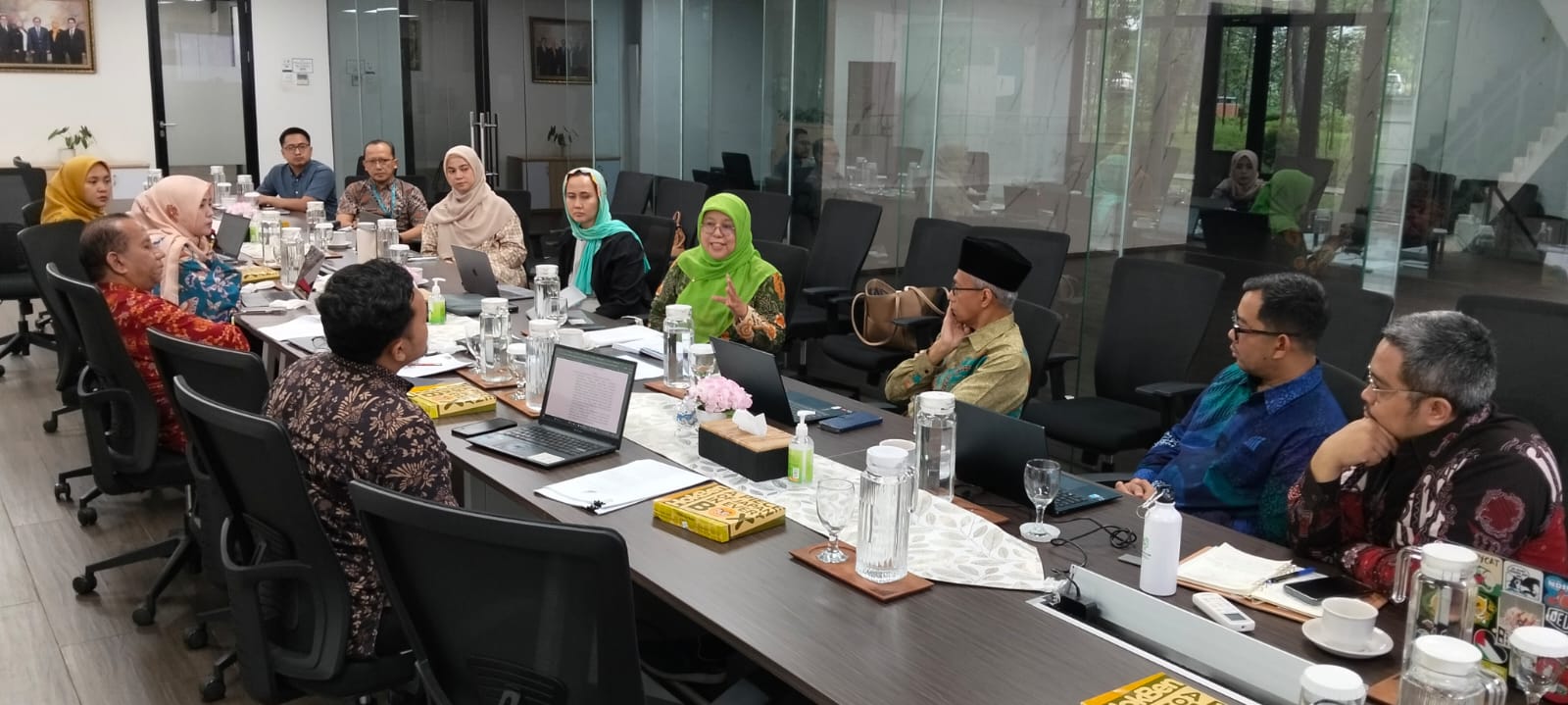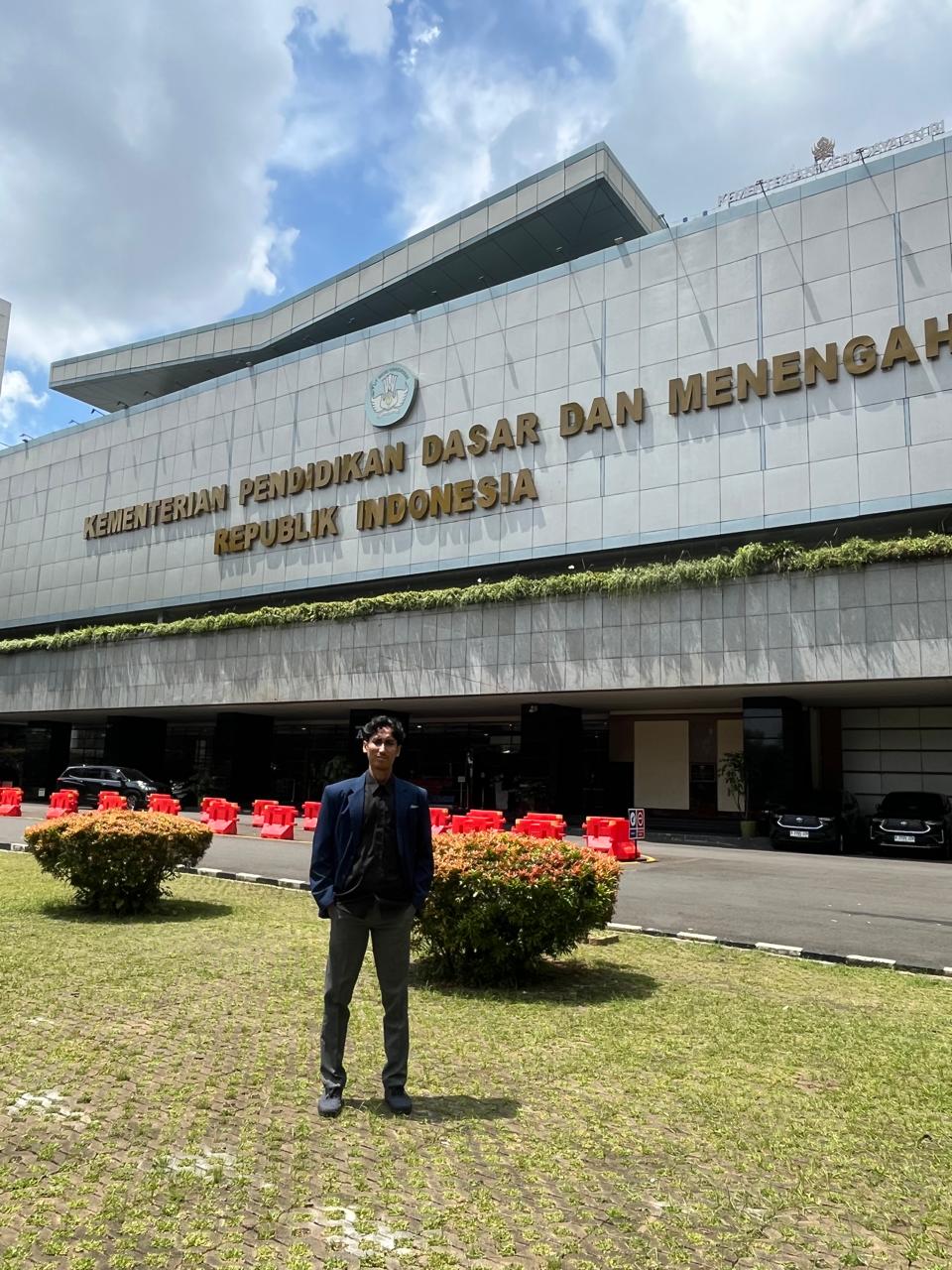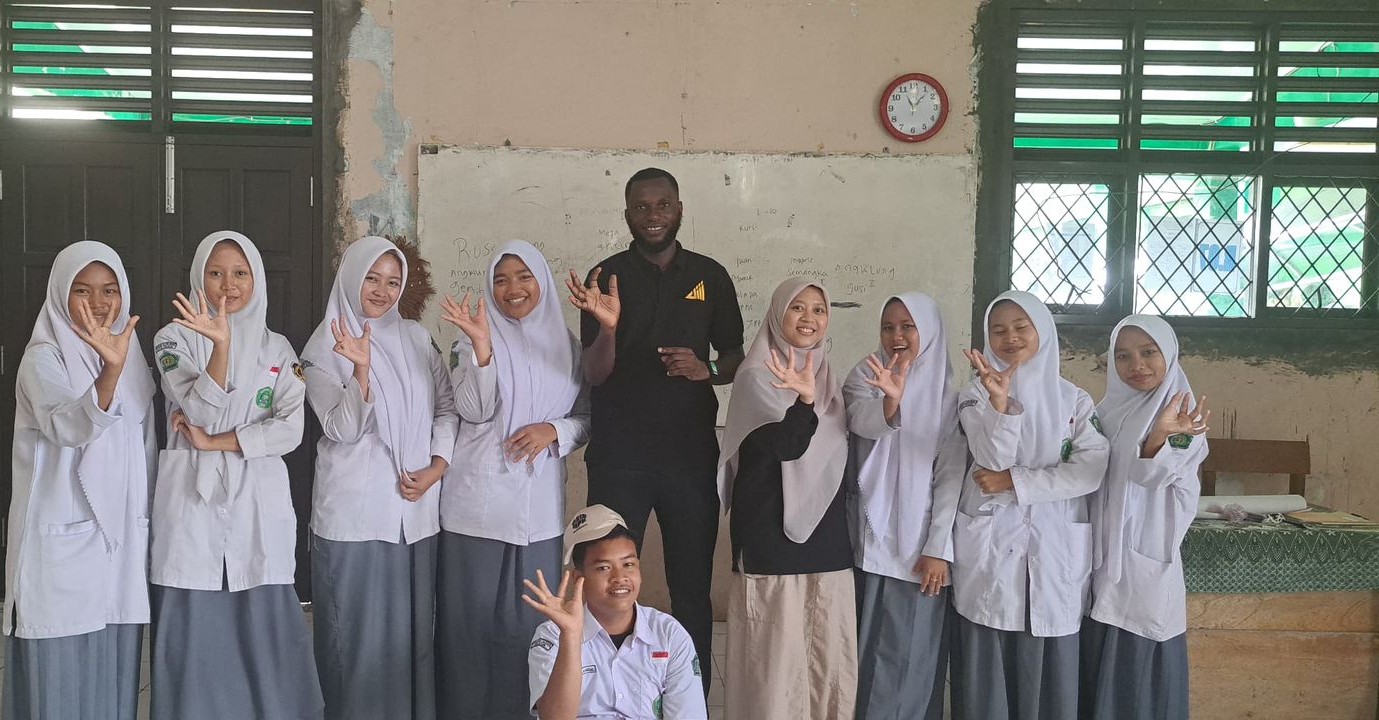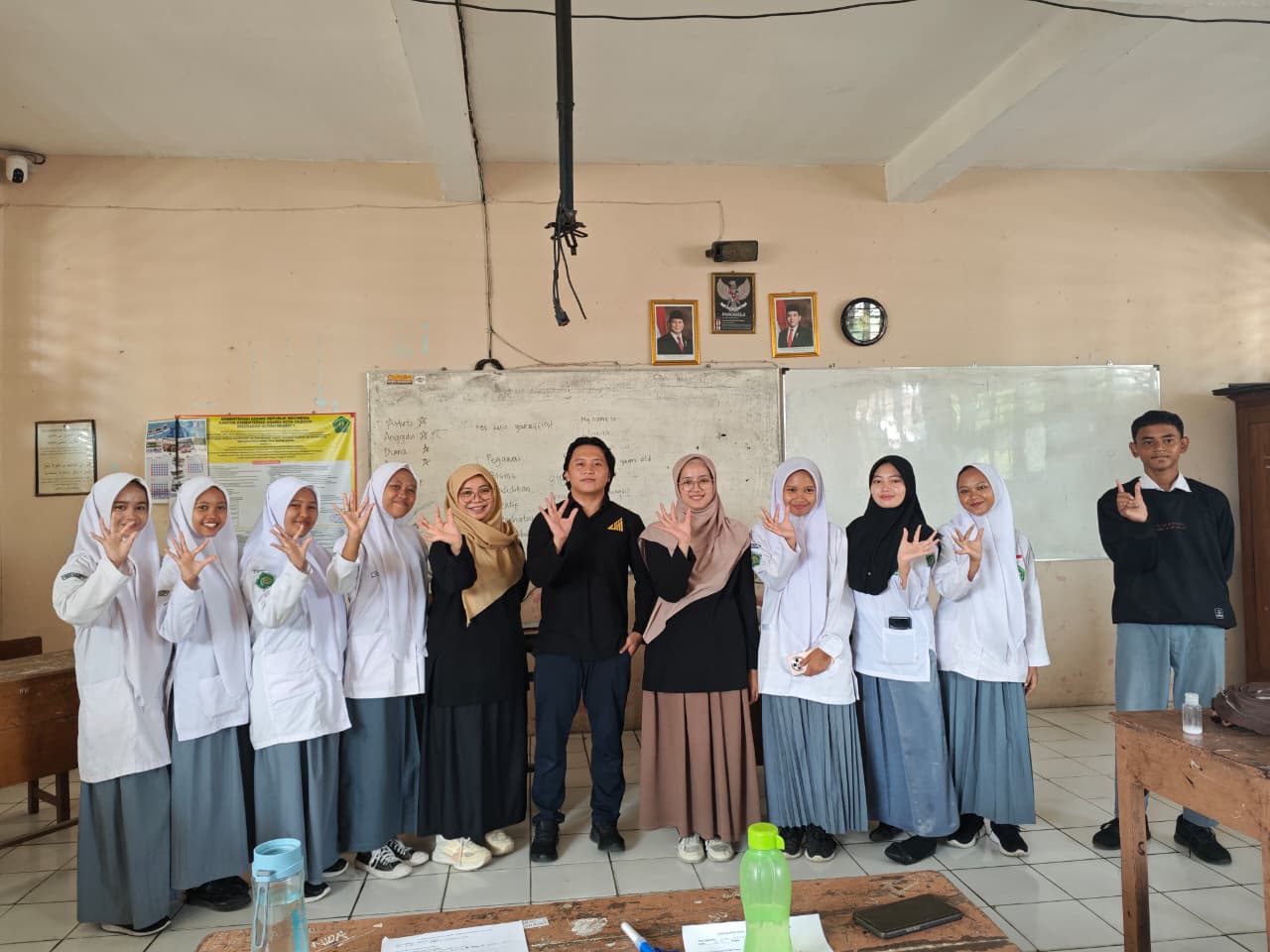Fakultas Ilmu Pendidikan UIII perkuat pusat riset dengan jejaring internasional

Fakultas Ilmu Pendidikan UIII perkuat pusat riset dengan jejaring internasional
Depok (ANTARA) - Fakultas Ilmu Pendidikan (Faculty of Education/FoE) Universitas Islam Internasional Indonesia (UIII) terus memperkuat posisinya sebagai pusat studi pascasarjana berbasis riset dengan jejaring internasional yang semakin luas.
Meski tergolong baru, fakultas ini dirancang untuk menjawab standar akademik global tanpa meninggalkan akar tradisi intelektual Islam.
Dekan Fakultas Pendidikan UIII, Prof Nina Nurmila di Depok, Jumat, mengatakan bahwa visi global tetap menjadi prioritas utama meskipun fakultas ini masih berusia muda.
Menurut dia, keberhasilan menarik minat universitas-universitas besar dunia untuk bekerja sama merupakan bukti kualitas akademik yang ditawarkan. "Di usia yang masih dini, FoE UIII telah berhasil menjalin kolaborasi internasional untuk menghadirkan program dual degree yang didukung penuh oleh beasiswa LPDP," jelas Nina. Ia juga menegaskan bahwa lulusan FoE akan siap menghadapi dunia nyata. Mereka dipersiapkan untuk menjadi akademisi, peneliti, konsultan pendidikan, dan profesi lainnya.
"Kurikulum kami disusun sedemikian rupa untuk membekali lulusan dengan keterampilan esensial agar mampu berkembang di lingkungan global," tambahnya. Melalui program magister dan doktoralnya, FoE UIII memadukan pelatihan riset yang mendalam dengan pengalaman akademik profesional yang relevan bagi dunia kerja.
Dengan skema gelar ganda (dual degree) hasil kolaborasi dengan universitas-universitas ternama dunia, mahasiswa memiliki kesempatan emas untuk menempuh studi di institusi bergengsi seperti University of Edinburgh, Deakin University, University of Melbourne, hingga SOAS University of London. Program ini memungkinkan mahasiswa terpilih untuk menyelesaikan sebagian masa studinya di Ulll dan melanjutkannya ke luar negeri guna memperluas wawasan riset serta jejaring global.
Selaras dengan visi tersebut, FoE telah merekrut dosen-dosen berkualitas terbaik di Indonesia yang merupakan lulusan universitas terbaik dunia. "Seluruh dosen kami adalah lulusan dari universitas-universitas ternama di dunia," kata Nina.
Open Rekrutmen Program Volunteer Pengajar BIPA (Bahasa Indonesia bagi Penutur Asing) UIII 2026
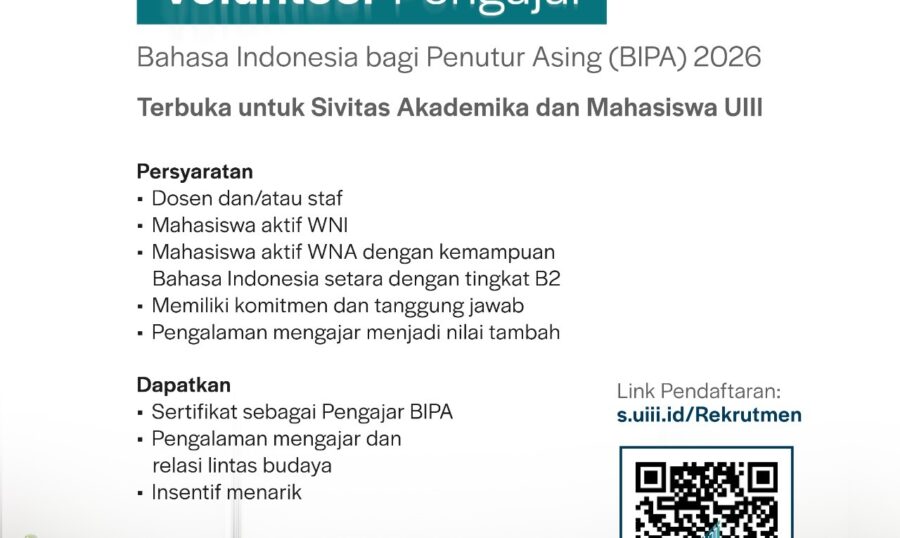
Open Rekrutmen
Program Volunteer Pengajar BIPA (Bahasa Indonesia bagi Penutur Asing) UIII 2026
Kantor Kemahasiswaan dan Layanan Internasional (KKLI) UIII membuka kesempatan kepada sivitas akademika UIII untuk berkontribusi dalam pengajaran Bahasa Indonesia kepada mahasiswa internasional UIII angkatan 2025. Melalui program ini, peserta tidak hanya berkesempatan mengenalkan Bahasa Indonesia dan budaya kepada penutur asing, tetapi juga dapat mengembangkan portofolio profesional dalam bidang komunikasi, pengajaran, dan interaksi lintas budaya.
📒Persyaratan
* Dosen dan/atau staf UIII
* Mahasiswa aktif UIII Warga Negara Indonesia (WNI)
* Mahasiswa aktif UIII Warga Negara Asing (WNA) dengan kemampuan Bahasa Indonesia setara tingkat B2/di atasnya
* Memiliki komitmen dan tanggung jawab
* Pengalaman mengajar menjadi nilai tambah
🗒️Fasilitas
* Sertifikat sebagai Pengajar BIPA
* Pengalaman mengajar dan relasi lintas budaya
* Insentif menarik
📆Waktu Pendaftaran
5–10 Februari 2026
Link Pendaftaran
https://s.uiii.id/Rekrutmen
▶️Untuk informasi lebih lanjut, silakan lihat dokumen PDF Terms of Reference Program pada tautan berikut https://s.uiii.id/ToR
▶️Lihat berita Program Volunteer Pengajar BIPA UIII Tahun 2025 pada tautan berikut :
https://uiii.ac.id/uiii-concludes-bipa-volunteering-program-with-success-celebrating-shared-learning-and-cultural-exchange/
Daftar Sekarang, Kuota Terbatas!
Tim BIPA UIII
Kantor Kemahasiswaan dan Layanan Internasional
Faculty of Education 2026 Affiliated Fellowships ✨

Faculty of Education, UIII is pleased to invite researchers and academics for the FoE Affiliated Fellowships ✨
Affiliated Fellowship
(Open all-year around)
The affiliated fellowship is unfunded fellowship intended for researchers or PhD scholars whose work aligns with the Faculty of Education (FoE) area of interest: Curriculum Teaching and Learning; Educational Assessment and Evaluation; Educational Policy, Management and Leadership; and Education and Society. This fellowship comes with office space, access to the university library collection, and engage with the academic activities at the FoE. The duration of the fellowship is between 1-3 months (with the possibility of extension).
If you are interested in an affiliated fellowship at the FoE, please download the form from https://s.uiii.id/FoEAffiliate2026 and send it to education@uiii.ac.id
For further information, please visit: https://foe.uiii.ac.id/
For inquiries, please contact: education@uiii.ac.id
UIII Takes the Front Line in Combating Sexual Violence on Campus

UIII Takes the Front Line in Combating Sexual Violence on Campus
January 26, 2026
By Supriyono | Photo: Achmad Jatnika
Universitas Islam Internasional Indonesia (UIII) reaffirmed its commitment to creating a safe, respectful, and inclusive academic environment by hosting a Sexual Violence Prevention and Awareness Session on 26 January 2026. It reflected UIII’s proactive approach to preventing and addressing sexual violence through institutional regulations, awareness-building, and survivor-centered responses.
Attended by students, university leaders, faculty members, and staff, the forum emphasized that sexual violence is not merely an individual issue but a structural challenge that must be addressed through firm policies and a culture of accountability within universities.
Secretary of UIII’s Sexual Violence Prevention and Response Task Force (PPKS), Prof. Nina Nurmila, PhD, stressed that sexual violence on campus is often silenced or even justified in the name of culture, family honour, or institutional reputation, an issue that persists in many countries.
“In many parts of the world, sexual violence is still ignored or protected under the pretext of tradition, family reputation, or institutional image. This culture of silence must be addressed. At UIII, we are committed to ensuring that sexual violence is never normalized or hidden,” said Prof. Nina.

She emphasized that UIII has established clear regulations and social mechanisms to prevent sexual violence, alongside firm procedures to handle cases when violations occur.
“We already have regulations and a prevention framework in place. If sexual violence occurs, the university is prepared to respond seriously, through verification, protection for victims, and decisive follow-up in accordance with our procedures. Our commitment is to ensure that the campus remains a safe space for everyone,” she added.
Also speaking at the event, Sondang Frishka Simanjuntak, S.H., LL.M, Commissioner of the National Commission on Violence Against Women (Komnas Perempuan), provided a national human rights perspective on sexual violence prevention.
She explained that Komnas Perempuan serves as Indonesia’s National Human Rights Institution (NHRI) with a specific mandate to build a conducive environment for the elimination of violence against women and the promotion of women’s human rights.
“In 2024 alone, 330,097 cases of gender-based violence against women were reported—an increase of 14.17 per cent from 289,111 cases in 2023,” Sondang said. “The majority of these cases occurred in the personal sphere, with 309,516 cases, followed by 12,004 cases in the public sphere and 209 cases involving state-related violence,” she added.
The session also drew lessons from other universities. Dr. Titin Ungsianik, S.Kp., M.B.A, Chairperson of the Sexual Violence Prevention and Response Task Force at Universitas Indonesia (UI), shared insights into UI’s preventive and responsive measures.
Dr. Titin elaborated that UI has developed a Standard Operating Procedure for the Prevention and Response of Sexual Violence based on Permendikbudristek No. 55/2024, complemented by continuous education through social media, webinars, leadership training, and campus-wide surveys.
“Our efforts include communicating regularly with relevant directorates, and allocating dedicated staff (stafsus) at the university level to support the implementation of task force duties and internal coordination. Additionally, we also establishing direct collaboration with various service units within and outside the university such as Security Office, Psychologists, Komnas Perempuan,” said Dr. Titin.
Through this forum, UIII reaffirmed its commitment to going beyond compliance by actively shaping a campus culture that prioritizes safety, dignity, and human rights. By strengthening its internal mechanisms and engaging with national and peer institutions, UIII continues to position itself as a leading university in confronting sexual violence in higher education.
Scholars in Residence 2026 Batch 8 & 9

The Faculty of Education at UIII invites all Ph.D. holders to participate in the Scholar-in-Residence (SIR) 2026, Batch 8 & 9 program, to spend three months as a research fellow.
During the grant period, the awardees are expected to be a guest lecturer in the class, consultant for students, thesis examiner, the speaker at lunch talk and write an article to be published in Muslim Education Review (MER). The topic of the article should match the four areas of concentration at the Faculty of Education:
➡️Curriculum, Teaching, & Learning
➡️Educational Management & Policy
➡️Educational Evaluation and Assessment
➡️Education and Society
Each recipient will receive IDR 12 Million grant per month (excluding tax) and are expected to live in the campus facilities during the grant period (on campus accommodation is provided).
The awardees will start on:
➡️May 1 – July 31, 2026 (Batch 8)
➡️September 1 – November 30, 2026 (Batch 9)
Requirements:
➡️CV
➡️Application Letter
➡️Writing sample (published article)
➡️Research writing proposal (to be published in MER)
?️Deadline: February 2, 2026
?Send your application to: education@uiii.ac.id
Please make sure to read all the details about the program.
Campus Safety: UIII’s Proactive Stand Against Sexual Violence

Campus Safety: UIII’s Proactive Stand Against Sexual Violence
January 14, 2026
By Dadi Darmadi
Depok – In the smart room of Universitas Islam Internasional Indonesia (UIII), a meeting on January 14, 2026, marked more than a routine administrative gathering. It represented a profound institutional pledge: a turning point in the university’s journey to ensure that the pursuit of knowledge is never overshadowed by fear or trauma.
The formal launch and socialization of the Sexual Violence Prevention and Handling Task Force (SATGAS PPKS) was not merely about compliance; it was a declaration of values, a commitment to transforming the campus into a true sanctuary of respect and safety.
“This represents the university’s commitment to implementing sexual violence prevention and handling in accordance with the national regulation,” stated Chaider Bamualim, University Secretary and Head of the newly formed PPKS Center. His words underscored a shift from policy on paper to actionable, structured responsibility. The task force is designed to be the central nervous system for this critical mission, moving beyond a reactive stance to embody a proactive, preventative culture.
The genesis of this task force is rooted in a sobering global and national reality. As highlighted during the proceedings, universities worldwide are tragically the second most common setting for sexual violence. This alarming statistic has shifted the conversation from isolated incidents to a recognized systemic challenge within higher education. In Indonesia, the response crystallized with the landmark Regulation of the Minister of Education (Permendikbudristek) Number 30 of 2021, mandating every university to establish robust prevention and handling mechanisms. UIII’s task force is its dedicated answer to this call, built upon a solid legal foundation that includes the broader Law Number 12 of 2022 on Sexual Violence Crimes.
Building Understanding and Empathy
What set this launch apart was its foundational focus on education and clarity. The session dedicated significant time to dismantling ambiguity around the term “sexual violence.” Moving beyond simplistic definitions, it outlined a spectrum of violations, from the overt horror of rape to the insidious harm of sexual intimidation, harassment, and exploitation. By detailing forms such as unwanted verbal advances, coercive threats, or the abuse of power for sexual gain, the task force made it clear: violence is not defined solely by physical contact but by the violation of consent, dignity, and personal autonomy.
The discussion courageously addressed the profound, often lifelong, repercussions for survivors: physical injury, deep psychological trauma (including PTSD and depression), social stigma, and derailed academic careers. This explicit linking of action to consequence served a dual purpose: to validate the experiences of survivors and to impress upon the entire community the grave weight of such violations.
The UIII SATGAS PPKS is envisioned as a multipronged entity, with functions carefully designed to mirror the complexity of the issue it addresses. It will serve as an Educator by spearheading ongoing campaigns to cultivate a campus-wide culture of consent, respect, and bystander intervention, ensuring every community member understands their rights and responsibilities. Simultaneously, it acts as a Capacity Builder, equipping staff, faculty, and student leaders with the necessary skills to identify early warning signs, provide appropriate first response, and navigate reporting procedures with sensitivity.
Beyond prevention, the task force provides a critical internal mechanism as an Investigator, offering a formal, fair, and victim-centric process to address reports. This ensures due process while steadfastly prioritizing survivor safety and well-being. Finally, it stands as a dedicated Advocate and Supporter, functioning as a confidential point of contact that guides survivors to professional services and champions policy enhancements to continually reinforce a safe and accountable environment. Together, these interconnected roles form a comprehensive framework for proactive prevention and responsive care.
Strategic Roles
The UIII PPKS special task force is envisioned as a multipronged entity, with functions carefully designed to mirror the complexity of the issue it addresses. It will serve as an “Educator” by spearheading ongoing campaigns to cultivate a campus-wide culture of consent, respect, and bystander intervention, ensuring every community member understands their rights and responsibilities.
Simultaneously, it acts as a “Capacity Builder,” equipping staff, faculty, and student leaders with the necessary skills to identify early warning signs, provide appropriate first response, and navigate reporting procedures with sensitivity.
Beyond prevention, the task force provides a critical internal mechanism as an “Investigator,” offering a formal, fair, and victim-centric process to address reports. This ensures due process while steadfastly prioritizing survivor safety and well-being.
Finally, it stands as a dedicated “Advocate and Supporter,” functioning as a confidential point of contact that guides survivors to professional services and champions policy enhancements to continually reinforce a safe and accountable environment. Together, these interconnected roles form a comprehensive framework for proactive prevention and responsive care.
This comprehensive approach reflects an understanding that safety is not created by a single policy but woven through every layer of institutional life.
The call for collective responsibility was powerfully echoed by Prof. Nina Nurmila, PhD, the dean of Faculty of Education and a senior leader in gender studies at UIII present at the launch. “We, as members of the academic community, must be responsive to the various challenges within the campus,” she urged, framing safety not as an administrative duty but as a shared covenant. “This is our collective responsibility for the comfort and security of all.”
From Pledge to Practice
The formation of the PPKS special task force is a definitive starting line, not a finish line. Its true test will lie in its visibility, accessibility, and the trust it builds within the student body and staff. The challenge ahead involves continuous dialogue, destigmatizing reporting, and fostering an environment where prevention is everyone’s business.
For UIII, this initiative transcends risk management. It is an investment in its core educational mission. A campus free from the threat of sexual violence is one where students and scholars can engage freely, debate vigorously, and learn optimally.
By taking this unequivocal stand, UIII is not only protecting its community but also nurturing the conditions for genuine intellectual and personal flourishing. It sends a clear message: here, dignity is non-negotiable, and the pursuit of knowledge is underpinned by an unwavering commitment to human respect.
source: https://uiii.ac.id/campus-safety-uiiis-proactive-stand-against-sexual-violence/
Get to know more about the Revision of National Education System progress – study visit to the Ministry of Primary and Secondary Education (MoPSE)

Looking to the education policy in action is very interesting. On Monday, December 22, 2025, we are going to the Ministry of Primary and Secondary Education (MoPSE) to know more about that. All my classmates from the Educational Policy Analysis class are scheduled to have a discussion with the Education Standards, Curriculum, and Assessment Agency (BSKAP), specifically the Centre for Education Standards and Policy (PSKP), which handles Indonesia's national education policy or regarding National Education Standards. The topic of this visit is discussing the Draft Law on the new National Education System (RUU Sisdiknas), which is included in the 2025 Priority National Legislation Program (Prolegnas). The status of the bill is currently in the discussion and refinement stage in parliament. We are guided by our lectures from the Educational Policy Analyst class, Dr. Lukman Nul Hakim and R. Alpha Amirrachman, M.Phil., Ph.D., on this agenda and prior to the visit, we were given some reading materials related to the draft Law (bill) from our lectures to enrich the discussion.
This visit truly excited me and sparked great enthusiasm. This was due to my second visit to MoPSE as a student at Universitas Islam Internasional Indonesia (UIII), but also because the focus of this discussion was directly related to education policy, which is my current field of interest and concentration study. Furthermore, this visit provided an opportunity for us as students to learn more about the evolution of Indonesian Education Law. This discussion provided a glimpse into the perspectives of stakeholders directly involved in the decision-making process. Through this interaction, we gained a deeper understanding of the sequence of policy formation at the national level. This allowed me as a student to understand the lengthy process of drafting a law and the various parties involved in its formation. This provided a collaborative experience for students, bridging theoretical learning in the classroom to the real-world practice.
In this regard, we gathered in the morning to the Jakarta for the Ministry office towards the departure. Upon arrival at MoPSE, we were greeted by the Policy Analysis and Advocacy Working Team from the ministry. We arrived a little earlier than planned, and we didn't waste our time there; we were discussing something else instead. Guided by Pak Alpha, we opened our initially discussion with Mr. Lukman and Ms. Esy about submitting students’ work (e.g articles) to the ministry journals. They informed us that there are two journals that students can submit to: "Jurnal Penelitian Kebijakan Pendidikan" (Journal of Education Policy Research) & "Jurnal Pendidikan dan Kebudayaan" (Journal of Education and Culture). Several explanations were given regarding what students need to consider when submitting their papers to journals, including the journal's twice-yearly publication timeline. I think this is very insightful, apart from the main material discussed that day, we also got information about where we can publish our scientific work.

Afterward, at 10 am, we are going to the main agenda, a discussion with the Head of the Center for Education Standards and Policy, Mr. Irsyad Zamjani, Ph.D. Prior to the discussion, we were briefly introduced before Mr. Irsyad continued with his presentation. He presented material on The Revision of the National Education System Law, starting with explaining the evolution of education policy in Indonesia and the background of why the revision of the Indonesian education law is necessary. He also added about the stages in the Sisdiknas Revision which consists of 5 stages of the legislation process, which begins with Initiation, Preparation, Discussion, Reflection and it ends with Determination. In addition to that, he explained that MoPSE has supported this legislation process and provided us a brief overview of what activities have been carried out by MoPSE during 2025.
There are several key revisions highlighted in this change to the education system. This change is arguably quite massive because it goes beyond policy as a philosophical foundation to include substantive studies. Several aspects can serve as students' takeaways, for example, educational governance and pathways, compulsory education, curriculum and learning, teacher welfare, and educational funding. One of my takeaways from this discussion is the extension of compulsory education from 9 to 13 years. One of the hot topics in education frequently discussed both inside and outside the classroom is how the acknowledgment of early childhood education (ECE) takes place, and this is one of them. The addition of one year of compulsory education to ECE acknowledges that preschool education is as important as other levels of education.
The discussion then continued with a question-and-answer session. Students appeared very enthusiastic in listening to Mr. Irsyad's presentation, as evidenced by the large number of students who raised questions. The questions asked by the students were very diverse; this may reflect our interest in the field of discussion. Some of them concerned indigenous communities, distant learning, educational budgeting, language policy, and concerns on the average length of schooling. Towards the end of the discussion, he added regarding the discussion of the Revision of the National Education System Law, MoPSE did not work alone, but also participated by inviting several related stakeholders and non-governmental organizations in the discussion regarding this legislation process.
Learning Beyond the Classroom: Teaching, Empathy, and Confidence
Learning Beyond the Classroom: Teaching, Empathy, and Confidence
By Nida Hanifah

Tuesday, December 16th, 2025, was the day I had the opportunity to directly participate in community engagement at Madrasah Aliyah Negeri in Cilegon. This journey was not simply a change of location, but the beginning of a meaningful learning experience, both for us as students and for the students we would meet. Throughout the journey, my mind was filled with questions and anxieties. How to deliver the lesson to the students there? Would they be able to understand me? considering it had been quite some time since I had interacted directly with high school students. These concerns mingled in my mind, occasionally diverted by the background music playing on the bus.
Upon arrival at MAN 1 Cilegon, we were warmly greeted by the teachers and students. The welcome was sincere and full of enthusiasm. Our presence, consisting of students from diverse backgrounds, both Indonesian and international, seemed to bring a new dimension to the school. My enthusiasm was ignited. I felt impatient to greet, share stories and knowledge with them. I assured myself, "Bismillah, I can make it."
The atmosphere reminded me of my past experiences as a volunteer teacher for Indonesian immigrant children in Malaysia. The smiles, curious gazes, and enthusiasm of the students at MAN 1 Cilegon brought back memories of my former students. They all showed an openness to new teachers, new knowledge, and new experiences. From that, I felt again that my presence as a teacher, even if only once, could be meaningful to them.

I was placed in one of the 11th grade classes with my teaching partner, Saidou. We began the session by introducing ourselves in English, both teachers and students. Initially, I expected the session to be short. However, in reality, the introduction process took quite long because most of the students had limited English proficiency. From their expressions and body language, I could sense fear, hesitation, and a lack of confidence when it came to answering our questions in English. At that moment, one thing that kept coming to my mind was that they needed encouragement and reassurance that it is okay to make mistakes and not give up. Learning is a journey, and it is never too late to start.
In the classroom, we focused on the importance of mastering English in education and the benefits of knowledge for the future. Considering they were in 11th grade and would graduate in the next one to two years, I felt it was important for them to start thinking about the direction and goals they wanted to achieve in life. Of the nine students in the class, three expressed their desire to continue their education abroad, to places like Egypt, Yemen, and England. This amazed me because at their age, I did not think of studying abroad. I believe these dreams will guide them towards a brighter future.
Throughout the learning process, we often translated explanations into Bahasa to ensure they understood the lesson. Nevertheless, I felt grateful that the hour and a half we had was worth it. Initially, some students seemed less enthusiastic, but this was more due to their limited English comprehension. After the material was explained again in Indonesian, they showed great enthusiasm and actively answered questions.
The game we played at the end of the class was super fun. It was a Snake Words game. From that game, I could see the competitiveness in the quiet children, this proves that we cannot judge people only by their appearance and visible habits. Everyone has a different way of learning and has different ambitions. I told them not to be discouraged even though their names are not the ones often called to receive awards during ceremonies, not the names that are always praised by teachers, not the names that are famous in school. They deserve to have a bright future, it does not mean that those who may seem invisible and unknown cannot prove that they can be successful in the future.
Through this experience, I realized that every student has a different background, way of thinking, and level of confidence. The biggest challenge for me is not only delivering the lesson, but also creating a safe and comfortable learning space, where students feel valued and are not afraid to make mistakes. Reflecting on this activity taught me that meaningful learning is born from empathy, effective communication, and a willingness to listen. Going forward, I hope this community engagement can continue to be implemented on an ongoing basis, so that the relationship between UIII and communities can grow stronger and have a positive impact on both sides.
Rethinking Education: Of the Children, With the Children, and For the Children
Rethinking Education: Of the Children, With the Children, and For the Children
By Ihsan-Isah Imam Zaman

On December 16, 2025, the Faculty of Education from Universitas Islam Internasional Indonesia conducted a community engagement visit to Madrasah Aliyah Negeri in Cilegon. MA Batch 4 and PhD Batch 3 students, along with lecturers and faculty staff, visited the school as part of their commitment to maintaining a beneficial relationship with the local community. During this brief visit, the lecturers and students conducted short learning sessions with the hope of benefiting the local students.
One of the lingering thoughts I had after this experience was the question: how do we really see education and school? Is it merely a process of transferring knowledge and building skills so students can become part of the future labor force? Is a school simply a place where children and youth go to acquire these things? These were some of the lingering thoughts I carried with me.
When looking at the current unemployment crisis prevalent not only in Indonesia but also in neighboring countries, I found myself wondering whether we are preparing our children for future disappointment. I recalled that a few years ago, I was in their position, and I wondered whether, if someone had told me then what I know now, it could have served as a cautionary reflection.
I wished I could have told them that, at this stage of life, what they have is energy and time. They trade that time to acquire knowledge and skills, which they later trade for opportunities and sources of income. But then again, are we not currently facing an unemployment crisis?
They say the best time to plant trees was a hundred years ago, and the next best time is today. In that spirit, I hope that educators and teachers can transform the way they see education. Children and youth need help to comprehend things that still feel incomprehensible to them. At the same time, they also need protection, while ensuring that their agency and autonomy are not infringed upon.
When we see children merely as future members of the labor force, we risk reducing them to mere products. But how do we reconcile the idea that children are our future without robbing them of their present? For us, we may help provide options and present possibilities, but the ultimate decision rests with them. Our responsibility, then, lies in shaping conditions that expand rather than narrow those possibilities, with an emphasis on nurturing and guiding them.
We do not have to worry that they may fail to contribute productively to the sustainability of humankind, as long as we nurture them with values that respect their agency and autonomy. By agency, I mean children’s capacity to have a voice and participate meaningfully in decisions that affect them, while autonomy refers to their growing ability to make age-appropriate choices and take responsibility.
To say the least, it is an undue burden to tell children outright that they are the future without risking their humanity. It is like telling Peter Parker that he must be Spider-Man. We do not have to make children become the heroes who must save a future that we, as adults, have helped shape.

If we teach them the values of humanity, care for the environment, and responsibility toward community, then we need not doubt whether they will destroy the future or help it flourish. From an Islamic perspective, there is a well-known saying that reminds us: “Do not raise your children the way your parents raised you, for your time and their time are different.”
I leave my lingering question unanswered. Perhaps, as a reader, you can answer it for yourself. Or perhaps you may find yourself asking the same question, and we may arrive at similar answers in time. I will end this reflection with this thought: the people we are today are shaped by our past context and environment, so what kind of present context and environment do we want our children to have? In the end, this reflection reminded me that education is not only about preparing children for the future, but also about honoring their dignity and agency in the present.

